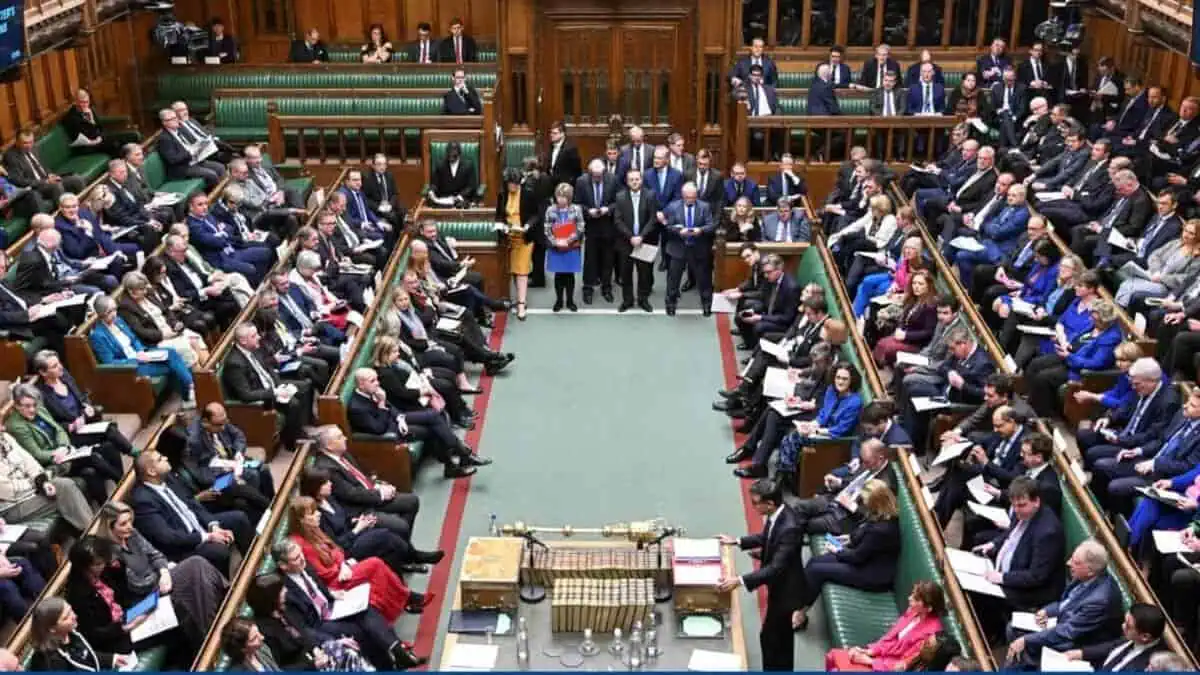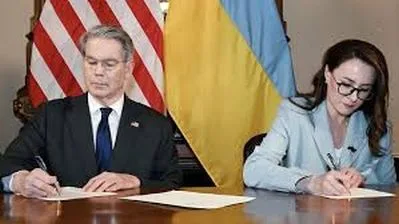Washington: The US and Ukraine on Wednesday signed an agreement granting American access to Ukraine’s vast mineral resources, finalising a deal months in the making that could enable continued military aid to Kyiv amid concerns that President Donald Trump might scale back support in ongoing peace negotiations with Russia.
The two sides offered only barebone details about the structure of the deal, which they called the United States-Ukraine Reinvestment Fund. But it is expected to give the US access to Ukraine’s valuable rare earth minerals while providing Kyiv a measure of assurance about continued American support in its grinding war with Russia.
“This agreement signals clearly to Russia that the Trump administration is committed to a peace process centred on a free, sovereign, and prosperous Ukraine over the long term,” Treasury Secretary Scott Bessent said in a statement. “President Trump envisioned this partnership between the American people and the Ukrainian people to show both sides’ commitment to lasting peace and prosperity in Ukraine.”
The announcement comes at a critical moment in the three-year war as Trump has grown increasingly frustrated with both sides. The signing comes two months after a different but similar agreement was nearly signed before being derailed in a tense Oval Office meeting involving President Donald Trump, Vice President JD Vance and Ukrainian President Volodymyr Zelenskyy.
Trump has long criticised Zelenskyy, saying he didn’t “have the cards” to win the war and blaming him for prolonging the killing by not giving up Crimea, but in recent days has rebuked Russian President Vladimir Putin as well, saying he was complicating negotiations with “very bad timing” in launching deadly strikes on Kyiv.
Trump said Wednesday night on NewsNation that the deal, “in theory,” means that the US will get more from Ukraine than it contributed. “I wanted to be protected,” he said, adding that he didn’t want to be looking “foolish” by not getting money back for the investment.
For Ukraine, the agreement is seen as key to ensuring its access to future US military aid.
“Truly, this is a strategic deal for the creation of an investment partner fund,” said Prime Minister Denys Shmyhal. “This is truly an equal and good international deal on joint investment in the development and restoration of Ukraine between the governments of the United States and Ukraine.”
Ukraine’s economy minister, Yulia Svyrydenko, flew to Washington on Wednesday to help finalize the deal.
“Together with the United States, we are creating the Fund that will attract global investment to our country,” she said in a post on X after the signing.
Earlier Wednesday, Bessent said during a Cabinet meeting at the White House — hours after Ukrainian officials indicated a deal was nearly finalised — that there was still work to do.
“The Ukrainians decided last night to make some last-minute changes,” Bessent said when asked about reports that Ukraine was ready to agree to the pact. “We’re sure that they will reconsider that. And we are ready to sign this afternoon if they are.”
He didn’t elaborate as to the late changes he said Ukraine made.
The US has been seeking access to more than 20 raw materials deemed strategically critical to its interests, including some non-minerals such as oil and natural gas. Among them are Ukraine’s deposits of titanium, which is used for making aircraft wings and other aerospace manufacturing, and uranium, which is used for nuclear power, medical equipment and weapons. Ukraine also has lithium, graphite and manganese, which are used in electric vehicle batteries.
After Kyiv felt the initial US draft of the deal disproportionately favoured American interests, it introduced new provisions aimed at addressing those concerns.
According to Shmyhal, the latest version would establish an equal partnership between the two countries and last for 10 years. Financial contributions to a joint fund would be made in cash, and only new US military aid would count toward the American share.
Assistance provided before the agreement was signed would not be counted. Unlike an earlier draft, the deal would not conflict with Ukraine’s path toward European Union membership — a key provision for Kyiv.
The Ukrainian Cabinet approved the agreement Wednesday, empowering Svyrydenko to sign it in Washington. The deal still needs to be ratified by the Ukrainian Parliament before it can take effect.
The negotiations come amid rocky progress in Washington’s push to stop the war.
Putin backs calls for a ceasefire before peace negotiations, “but before it’s done, it’s necessary to answer a few questions and sort out a few nuances,” Kremlin spokesman Dmitry Peskov said.
Putin is also ready for direct talks with Ukraine without preconditions to seek a peace deal, he added.
“We realise that Washington wants to achieve quick progress, but we hope for understanding that the Ukrainian crisis settlement is far too complex to be done quickly,” Peskov said during his daily conference call with reporters.
Trump has expressed frustration over the slow pace of progress in negotiations aimed at stopping the war. Western European leaders have accused Putin of stalling while his forces seek to grab more Ukrainian land.
Russia has captured nearly a fifth of Ukraine’s territory since Moscow’s forces launched a full-scale invasion on February 24, 2022.
Trump has long dismissed the war as a waste of lives and American taxpayer money — a complaint he repeated Wednesday during his Cabinet meeting. That could spell an end to crucial military help for Ukraine and heavier economic sanctions on Russia.
The US State Department on Tuesday tried again to push both sides to move more quickly and warned that the US could pull out of the negotiations if there’s no progress.
“We are now at a time where concrete proposals need to be delivered by the two parties on how to end this conflict,” department spokeswoman Tammy Bruce quoted Secretary of State Marco Rubio as telling her.
Russia has effectively rejected a US proposal for an immediate and full 30-day ceasefire, making it conditional on a halt to Ukraine’s mobilisation effort and Western arms supplies to Kyiv.
Russian Foreign Minister Sergey Lavrov claimed Wednesday that Ukraine had accepted an unconditional truce only because it was being pushed back on the battlefield, where the bigger Russian forces have the upper hand.
Meanwhile, Ukrainian civilians have been killed or wounded in attacks every day this year, according to a UN report presented Tuesday in New York.
The UN Human Rights Office said in the report that in the first three months of this year, it had verified 2,641 civilian casualties in Ukraine. That was almost 900 more than during the same period last year.
Also, between April 1-24, civilian casualties in Ukraine were up 46 per cent from the same weeks in 2024, it said.
The daily grind of the war shows no sign of letting up. A nighttime Russian drone attack on Ukraine’s second-largest city, Kharkiv, wounded at least 45 civilians, Ukrainian officials said.
Also Wednesday, the Ukrainian Security Service claimed its drones struck the Murom Instrument Engineering Plant in Russia’s Vladimir region overnight, causing five explosions and a fire at the military facility.
The claim could not be independently verified.









